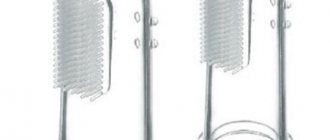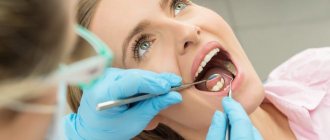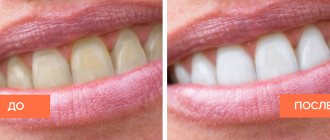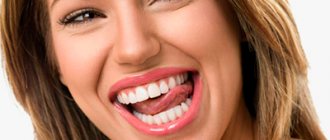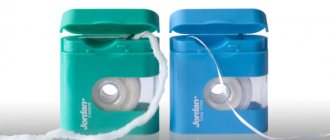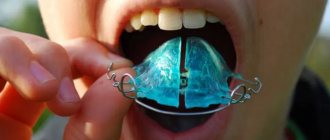01.12.2019
Every preschooler knows exactly how many times a day he needs to brush his teeth - twice: in the evening and in the morning. But not everyone knows about the existence of exceptions to this rule and about the correct technique for carrying out the hygiene procedure. This will be discussed in the article.
Why do you need to brush your teeth?
Why do you need to brush your teeth several times every day?
The oral cavity is an ideal place for the rapid reproduction and activity of pathogenic bacteria. Here, optimal conditions are created for various types of microorganisms:
- Temperature close to 37 °C.
- High humidity.
- Availability of a food source (leftover food).
- Lack of sunlight, which is a source of ultraviolet radiation that kills harmful bacteria.
This is why microbes multiply quickly in the cavity and mouth and feel very comfortable there. Among the representatives of microflora there are both beneficial microorganisms and pathogenic ones, which, as a result of active division, can provoke the development of various serious diseases, such as stomatitis and caries. Since thorough brushing of teeth eliminates a significant part of these microorganisms, their negative effects are minimized. For this reason, you need to brush your teeth regularly and do it correctly.
How long
At different times, scientific sources and dentists spoke about different times for oral hygiene. In books from the 50s you can find information where it is recommended to perform at least 150-200 brush strokes. It was believed that only with such a thorough procedure would it be possible to achieve a good effect in removing food debris and plaque.
Modern dentists believe that 10-15 movements in each direction are enough to achieve a positive effect when caring for the oral cavity. Basically, the time for brushing teeth depends on the structure of the elements, the age of the patient and the presence of orthodontic structures.
Cleaning takes the longest for people with bite pathologies (crossbite, twisted elements) and patients wearing braces
Under the corrective structures, food residues are actively clogged, which cannot be eliminated using a standard hygiene kit. For this reason, people undergoing orthodontic treatment should use additional care products (brushes, irrigators, dental floss and rinses).
The minimum duration of hygiene procedures is at least 3 minutes. This is due to the fact that the fluoride components of the pastes are not immediately absorbed into the enamel, but rather some time after the start of manipulation. It is also not recommended to immediately spit out the foam formed as a result of cleaning. For the best effect from using fluoride-containing products, you need to keep the paste in your mouth. The maximum time for oral care is 4 minutes. More thorough cleansing is harmful because it can lead to abrasion of the enamel layer and increase its sensitivity to external irritants. The optimal duration of manipulation is from 3 to 4 minutes.
How many minutes should you brush your teeth?
If you ask a dentist how long you need to brush your teeth, he will definitely answer: “to clean the oral cavity well, you need to brush your teeth for at least three minutes.” That is, for each half of the upper and lower jaw you need to allocate at least 45 seconds. Unfortunately, you don’t always have a couple of extra seconds, especially when you have to run to work in the morning and want to go to bed early in the evening. Poor cleaning of the oral cavity leads to the fact that plaque and microorganisms are not removed well enough. As a result, various problems begin to appear, the solution of which will require several days or months, as well as spending your finances. Therefore, whenever you need to brush your teeth, it is better to be patient and devote enough time to this important hygiene procedure.
Proper Teeth Brushing Technique
The dentition contains many so-called hard-to-reach areas in which food debris collects and plaque accumulates. To remove it as well as possible, you need to brush your teeth properly. The following rules can help with this:
- Toothpaste must be applied in sufficient quantities, but without fanaticism - the length of the strip should be approximately one centimeter.
- Using swiping movements from the gums, we clean the chewing teeth from the cheek side.
- We brush the front teeth in a circular motion and from side to side.
- We perform 20 movements on each section and then move on to the next one.
Using a toothbrush, you should thoroughly clean your teeth on all sides, not forgetting your tongue, because bacterial plaque accumulates on it too. Finally, rinse your mouth with clean water.
Time depending on method
There are several professional mouth cleaning techniques that anyone can practice at home. The chosen technique also determines how long hygiene will take. Let's consider popular ways to care for the elements of the oral cavity:
How to floss
- Charter method. Involves shaking movements with a brush located at an angle of 45-50 degrees to the gums. The method allows you to effectively clean food debris in hard-to-reach areas and perform a natural massage of the gums.
- Bass method. The technology is similar to the Charter method, but differs in more frequent vibrating movements. It imitates the movements of an electric toothbrush, which removes plaque and unhardened tartar more effectively than standard devices.
- Leonard's method. Involves brush movements perpendicular to the surface being treated.
- Reite's method. It is based on rolling movements of the pile in the direction from the gums to the cutting part of the teeth.
- Smith-bell system. When caring for the oral cavity, a person additionally performs movements that simulate chewing food. Use the brush in a circular motion with slight pressure of the bristles on the enamel.
The time for cleaning teeth using different methods may vary. It must be remembered that each surface of the crown must be processed at least 8 times. The total time of the hygiene procedure, regardless of the chosen method, cannot be less than 2.5 minutes for adults.
If a person cannot independently determine the time for optimal oral care, then he needs to see a dentist. The doctor will select the optimal method of care depending on the structural features of the row elements and the presence of malocclusion in the patient.
How many times a day should you brush your teeth?
Should I brush my teeth in the morning? When should I brush my teeth before or after breakfast?
Dentists indicate the need to brush your teeth at least 2 times a day - in the morning after sleep before breakfast and in the evening after meals, i.e. for the night. It is most optimal to carry out hygiene procedures after each meal, especially if a person has dentures, braces or other orthodontic structures. In such cases, a person is at risk of developing dental diseases; accordingly, special attention should be paid to oral care. Of course, brushing your teeth after every meal can be difficult, so rinsing your mouth with clean water or using chewing gum is acceptable.
Some people may have a natural question: is it harmful to brush your teeth frequently? If you choose the right hygiene products and follow the cleaning technique, then doing this is not only not harmful, but also useful. The cleaner your mouth is, the less likely you are to develop various dental problems.
In adults
Brushing your teeth in the morning removes plaque accumulated during the night, gives your teeth a clean look and ensures fresh breath. However, you should not brush your teeth immediately after breakfast, since after eating, the enamel is most sensitive and susceptible to destruction. The duration of brushing your teeth should be 2-3 minutes, on average 1 minute for each jaw. Unfortunately, very often teeth are brushed in a hurry, without devoting the necessary time to oral hygiene. Such care can cause plaque formation and gum inflammation. Bacteria accumulated under plaque destroy tooth enamel and cause inflammation in the oral cavity. Proper hygiene prevents the development of caries and gum disease.
At what age should a child brush his teeth?
This question concerns all young fathers and mothers. What do experts say about this? Should children have their teeth brushed? Dentists offer two options:
- Children should begin oral hygiene procedures even before the first tooth erupts. Microorganisms accumulate both on the surface of the enamel and on the mucous membrane of the cheeks, gums, palate, and tongue. Therefore, young children, like adults, need hygiene. Cleaning the oral cavity should begin at 3-4 months of age. For this purpose, a special children's silicone brush is used, which is placed on the finger.
- Children need to brush their teeth after teething. This process is individual for each child, so it is difficult to give exact dates. There is no need to try to brush the tooth at the moment of its eruption; you need to wait until it is completely finished so that the child does not get hurt. After this, you can purchase a children's brush, which has bristles made of silicone and has a special stop. You need to start brushing your teeth without toothpaste.
Since there is no clear answer to the question posed, each situation must be approached individually. To begin, parents should consult with their pediatrician and pediatric dentist. Specialists will help you choose the optimal time to start oral hygiene procedures.
The child has
Brushing your teeth in childhood is an important point, since habits formed in childhood most often contribute to the formation of the right attitude towards hygiene and your health in the future. Caring for children's teeth is slightly different from hygiene for adults. When your child's first baby teeth erupt, you should begin caring for them. To do this, you need to carefully wipe them with special sanitary napkins or gauze soaked in warm boiled water. You can also purchase special silicone brushes and pastes designed for babies that are safe to swallow. You need to start brushing your teeth once a day, gradually accustoming your child to the fact that the procedure is regular. Once your child gets used to it, you can add one more dental hygiene routine to the day. In adulthood, the hygiene process must be under the supervision of an adult in order to explain to the child the correct cleaning technique. It is extremely important that brushing teeth does not cause negativity in the child, for this you should come up with some kind of encouragement or incentive.
What types of toothbrushes and toothpastes are there?
In any store or pharmacy you can see several varieties of toothbrushes and toothpastes. Such diversity was not invented without reason, because these funds should be selected taking into account the characteristics of a particular person.
Toothbrushes differ in their degree of hardness:
- The soft bristles do not injure the gums and are therefore suitable for people with increased sensitivity and patients with periodontal disease.
- Hard brushes provide good plaque removal, but can damage your gums.
- Medium-hard bristles are universal and suitable for most people.
If you don’t know which brush you need, your dentist will help you choose it after he conducts an examination.
What toothpaste should you use to make your teeth white? How do different pastes differ from each other?
Toothpastes may contain abrasives (help remove plaque and slightly whiten the enamel), fluoride, anti-inflammatory components and other ingredients. Therefore, it is necessary to choose a toothpaste based on the oral condition of a particular person. For example, various pastes can be used to eliminate bleeding gums, their inflammation, or to reduce sensitivity. If you have such problems, you need to select a certain type of toothpaste that your dentist can recommend.
Therapeutic and prophylactic pastes
These pastes contain substances that have an antibacterial effect. Their effect is to reduce inflammation and prevent the development of caries. Such pastes should be purchased on the recommendation of a specialist in pharmacies.
Such pastes are divided into:
- Contains extracts of medicinal herbs and essential oils that help relieve inflammation and accelerate tissue regeneration processes. The essential oils in the composition help eliminate bad breath.
- Containing minerals and salts, which helps strengthen tooth enamel, accelerate tissue healing and reduce plaque formation.
Additional hygiene products
Experts recommend not limiting yourself to a regular toothbrush and toothpaste and using additional products daily (see photo) to maintain proper oral cleanliness. Among them are:
Dental floss (floss). Necessary to clean the spaces between teeth from plaque. Flosses are made from synthetic materials or silk. Dental floss can be regular or waxed. In the first case, it will be divided into several threads when brushing your teeth. They clean teeth better due to the larger contact area. Wax-coated threads do not separate and are able to easily penetrate between the contact surfaces of the teeth. They are recommended for children, as well as people who are just starting to use this hygiene product. In addition, flosses differ in cross-section, which can be round, ribbon, flat or voluminous. This variety allows you to individually choose dental floss based on the anatomical structure of each person’s dentition.
Irrigator. It is a special device that creates a thin stream of water under high pressure. This pressure is selected so as to effectively clean the surface of the teeth from plaque without injuring the soft tissues. On the contrary, the irrigator has a massage effect on the gums, relieves inflammation and eliminates bleeding. The device is indispensable for people who have braces or other bulky dental structures that are difficult to clean.
- Mouth rinses. Some people believe that the only purpose of mouthwashes is to freshen your breath. In fact, these hygiene products have a much wider spectrum of action. They may contain antiseptic and anti-inflammatory components, minerals, agents that help relieve bleeding gums, etc. Based on the set of these active substances, all rinses are divided into hygienic and therapeutic and prophylactic.
- Brushes and tongue scrapers. They help remove plaque and microorganisms from the surface of the tongue. For high-quality and complete oral hygiene, it must also be cleaned regularly. This procedure will be of particular benefit to patients who smoke, as well as those suffering from diseases of the upper gastrointestinal tract, accompanied by bad breath.
- Cleaners. These devices are designed both for cleaning interdental spaces and can be used for cleaning fixed dentures, orthodontic appliances, etc. They can be made in the shape of a cylinder or a cone. In addition, they differ in size. The service life of one such product is about 5 days.
- Dentifrice. It is a good preventative against caries. It has a polishing and whitening effect, helping to remove stains from tea, coffee, and cigarettes. The question is often asked: is it harmful to brush your teeth with tooth powder? There is only one answer: no, it is not harmful. The decline in its popularity occurred mainly as a result of a marketing policy focusing on the promotion of oral hygiene products (pastes, rinses) of large international companies.
- Chewing gum. It is an excellent solution for mechanical removal of food residues. At the same time, you need to know that you can chew gum only after eating for 10 minutes, no more. You also need to make sure that there is no sugar in its composition. Chewing gum should not be used by patients with phenylketonuria, children with baby teeth, during orthodontic treatment, pregnant women and nursing mothers.
Using a regular brush in combination with these products will allow you to better clean the oral cavity of plaque. For an unprepared person, such an abundance of hygiene products can lead to difficulties in choosing the most suitable ones. In such situations, it is necessary to contact a dentist who will select everything necessary for high-quality cleaning of the oral cavity, taking into account the characteristics of a particular patient.
Three common mistakes
These mistakes lead to inflammation of the gums, the development of caries, and wedge-shaped defects.
- Move not from top to bottom, but from right to left horizontally. With this approach, food accumulates in the gaps, which leads to the destruction of the enamel.
- Store the brush in the bathroom without a cap and rinse it rarely. Due to high humidity, bacteria quickly accumulate on the bristles. To avoid this, rinse the brush thoroughly each time after the procedure and store it in a plastic case.
- Use regular thread instead of dental floss. Never do this! A regular thread is not sterile, which means it can lead to infection.
What happens if you don't brush your teeth for a long time?
As noted earlier, pathogenic microorganisms feel quite comfortable in the oral cavity. Together with food particles, they populate the entire surface of the oral cavity (enamel, mucous membranes). As a result, over time, so-called dental plaque forms. It turns out to be a vicious circle when bacteria first select comfortable conditions for their existence, and then have a negative impact on the environment by releasing waste products. Thus, toxic metabolic products cause both destruction of tooth enamel and inflammation of the mucous membranes, for example, gingivitis and a more serious disease - periodontitis (can be a complication of gingivitis). This pathology is characterized by the formation of pathological pockets between the tooth and gum tissue. They are also the entrance gates for infection that affects the tooth root and ligamentous apparatus. Severe periodontitis is characterized by exposure of the neck of the tooth, loosening and loss of teeth. Treatment of such cases is only surgical and requires a lot of time.
The golden rule of medicine says: it is easier to prevent any disease than to treat it later. This statement also applies to dentistry. High-quality and regular teeth cleaning will help you avoid many problems that will not only require time to eliminate, but will also be accompanied by significant material costs.
